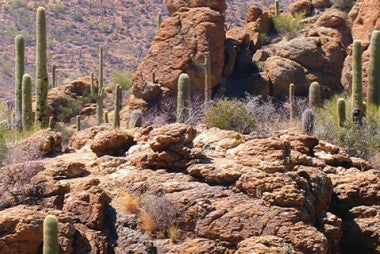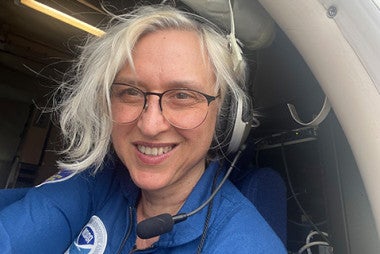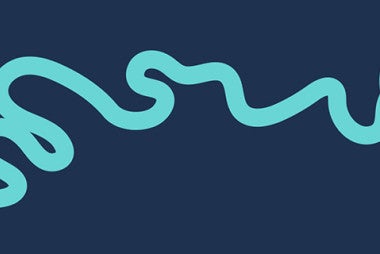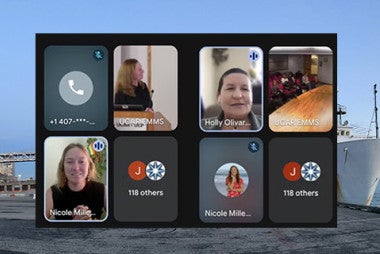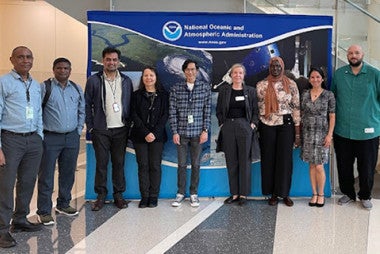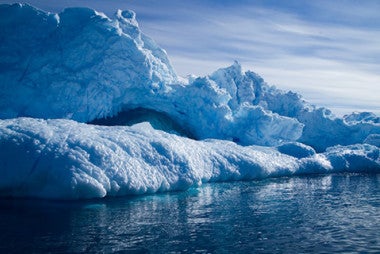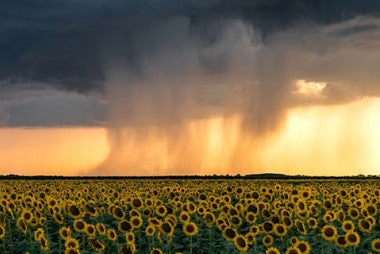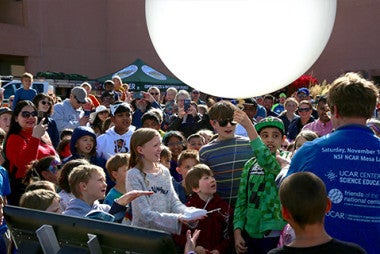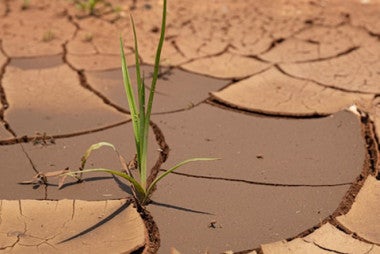2023 Space Weather Workshop
One of the many services that UCAR | CPAESS provides the Earth system science community is the convening of members from across the globe to gather and learn from each other, share information, and collaborate to move science forward. The recent Space Weather Workshop well represented these important goals. The workshop took place both virtually and in person in Boulder from April 17-21, 2023.
The Space Weather Workshop is an annual conference that brings industry, academia, and government agencies together in a lively dialog about space weather. What began in 1996 as a conference for the space weather user community, Space Weather Workshop has evolved into the Nation's leading conference on all issues relating to space weather.
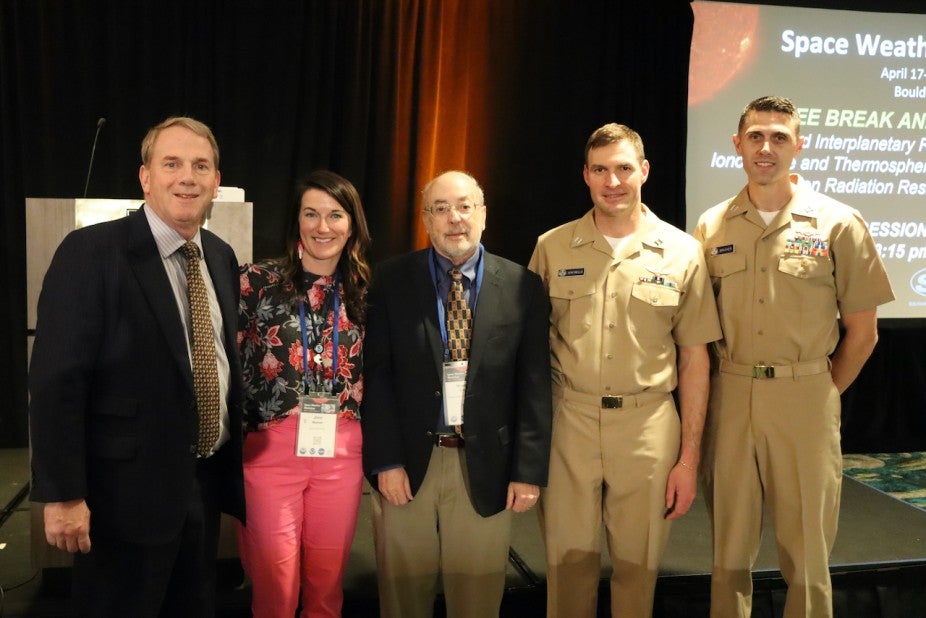
Pictured above (left to right) Bill Murtagh, NOAA Space Weather Prediction Center (SWPC); Dr. Jennifer Meehan, National Space Weather Program Manager, NOAA NWS; Dr. Howard Singer, NOAA Space Weather Prediction Center (SWPC); Lt. Frank Centinello III, NOAA ; and Lt. Bryan Brasher, NOAA.
The conference addresses the remarkably diverse impacts of space weather on today's technology. The program highlights space weather impacts in several areas, including communications, navigation, spacecraft operations, human space exploration, aviation, space traffic coordination, and electric power. The workshop will also focus on the highest priority needs for operational services that can guide future research and new high-value capabilities that can be transitioned into operations. The conference fosters communication among researchers, space weather service providers, and users of space weather services. Space weather is important because "disturbances can cause problems with radio communications, Global Navigation Satellite Systems (such as Global Positioning Systems or GPS), power grids, and satellites (NOAA)."
This workshop grows each year, and this year was no exception. We had a record-breaking 554 registrants and 128 virtual participants. 24 countries were represented at this conference, as space weather and its impacts are a matter of concern across the globe, with 64 international attendees in-person and 28 virtual.
The Space Weather Workshop kicked off with a talk by Bill Murtagh, NOAA Space Weather Prediction Center (SWPC) and Jinni Meehan, National Weather Service (NWS) Headquarters on Building National Resilience for Space Weather Storms and continued with speakers from across NASA, NOAA, Southwest Research Institute (SwRI), Ball Aerospace, California Institute of Technology, and numerous other federal agencies, non-profits, businesses, and academic institutions. Find the detailed agenda for this workshop and discover the many plenaries, talks, working groups, and advisory committees activities.
Special attention was given to students during the Space Weather Workshop with a student program on Monday evening, as well as on Wednesday. Twenty-one students attended and the National Science Foundation (NSF) sponsored 17 students with support for lodging, ground transportation & registration fees.
Another workshop highlight was the tours at NOAA’s Space Weather Prediction Center (SWPC). Two different tours were available to registrants to get an insider look at their facilities on Tuesday and Thursday.
Additionally, 121 abstracts were submitted for this conference, of which 113 were in-person, including 26 students presenting posters in-person. There were lightning talks selected from the poster submissions which gave 2 slide presentations lasting 5 minutes each at the end of the days of Tuesday, Wednesday, and Thursday (8 each day). Please find the booklet of poster abstracts here and view the posters here. There are 70 available online. Posters and abstracts were collected and organized into these categories: Solar and Interplanetary Research and Applications; Ionosphere and Thermosphere Research and Applications; Geospace/Magnetosphere Research and Applications; Aviation Radiation Research and Applications; and Space Weather Policy and General Space Weather Contributions.
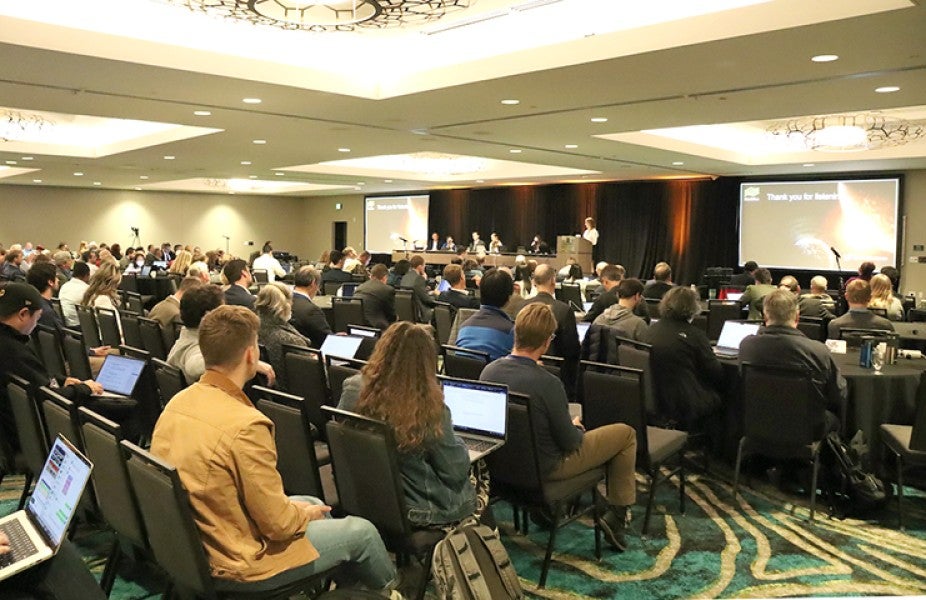
Space Weather Workshop audience listening to a plenary talk.
A special thank you to our sponsors of the Space Weather Workshop Southwest Research Institute (SWRI) who sponsored the banquet on Wednesday evening, Ball Aerospace who sponsored the Networking reception on Monday evening, and of course NASA, NOAA, NSF & CPAESS. NSF also sponsored all travel and workshop fees for 17 students.
Additionally, a shout out to members of the CPAESS Travel and Event Team that managed and assisted with the event: Michelle McCambridge, CPAESS Event & Travel Team Lead; Maggie Costley, Travel Team Lead for setting up the badging system, and Jessica Martinez, Meeting Planner for onsite support of the workshop, as well as Travel Coordinators Rebecca Cribelli and Sarah Herring who helped Jessica. Rebecca also arranged travel for many attendees; and lastly Alex Meyer, CPAESS Graphic Designer for capturing some great photos of the event.
